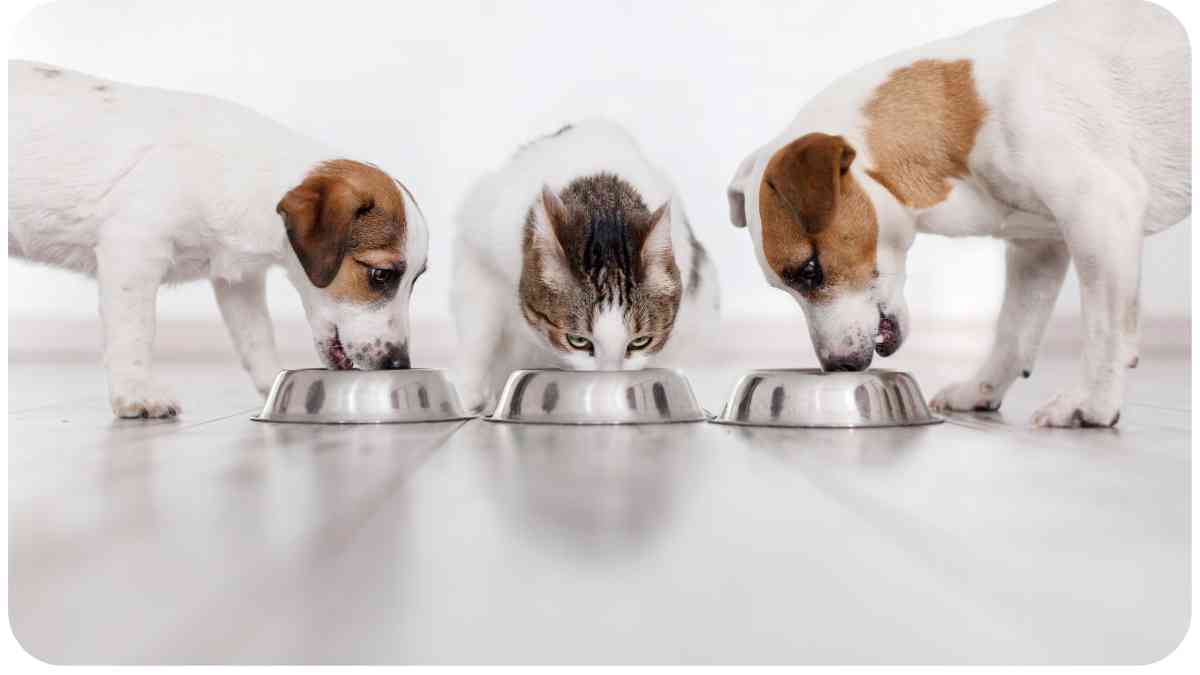Ever caught yourself wondering if your dog can enjoy a cheesy treat now and then? You’re not alone! Cheese is a popular snack for humans, but when it comes to our furry friends, it’s essential to tread carefully.
While a little cheese might seem harmless, there are several factors to consider before sharing this creamy delight with your canine companion. Let’s dive into everything you need to know about dogs and cheese.
| Key Takeaways |
|---|
| Cheese can be a tasty treat for dogs but should be given in moderation. |
| Not all dogs can tolerate cheese due to lactose intolerance. |
| Choose low-fat cheeses like cottage cheese or ricotta for safer options. |
| Avoid cheeses with high sodium or added ingredients. |
| Monitor your dog for any adverse reactions and consult a vet if necessary. |
| Consider healthier treat alternatives such as fruits and vegetables. |
Is Cheese Safe for Dogs?

Cheese and Dogs: A General Overview
Cheese can be a delightful treat for dogs, but it’s not always as straightforward as it seems. Cheese offers a rich source of protein and calcium, which are beneficial to dogs in moderation. However, not all cheeses are created equal, and what’s good for one dog may not be suitable for another.
Broccoli can be a healthy treat for dogs when given in moderation. According to experts, broccoli provides essential nutrients like vitamins and fiber, making it a great addition to your dog’s diet. However, overfeeding broccoli may lead to digestive issues.
Nutritional Value of Cheese for Dogs
Here’s a quick snapshot of what cheese brings to the table for your dog:
| Nutrient | Amount per 100g of Cheese |
|---|---|
| Protein | 25g |
| Calcium | 700mg |
| Fat | 33g |
| Sodium | 600mg |
While cheese contains beneficial nutrients, the high fat and sodium content can pose risks if consumed in large amounts.
Potential Risks of Feeding Cheese to Dogs
Lactose Intolerance in Dogs
Many dogs are lactose intolerant, meaning they lack the enzyme lactase needed to digest lactose properly. This can lead to digestive issues such as diarrhea and stomach upset. If you notice any of these symptoms after feeding your dog cheese, it’s a sign to avoid it in the future.
High Fat Content
Cheese is notoriously high in fat, which can contribute to obesity and pancreatitis in dogs if fed too frequently. Obesity can lead to various health problems, including joint issues and diabetes.
Sodium and Additives
Cheese often contains added salt and other preservatives that are not ideal for dogs. Excessive sodium intake can lead to hypertension and other health issues in pets.
Carrots are a popular snack for dogs due to their crunchiness and nutritional benefits. Many pet owners wonder, are carrots good for dogs? Yes, they are, as carrots provide vitamins, fiber, and promote dental health. Just be sure to serve them in moderation.
Safe Cheese Choices for Dogs
Low-Fat Cheese Options
Opting for low-fat cheese can help mitigate some of the risks associated with feeding cheese to dogs. Some dog-friendly cheese options include:
| Cheese Type | Fat Content (per 100g) |
|---|---|
| Cottage Cheese | 4g |
| Ricotta | 6g |
| Swiss Cheese | 7g |
These cheeses are lower in fat and can be a safer choice in moderation.
Cheeses with Minimal Additives
Choosing cheeses without added herbs, spices, or flavorings is essential. Plain cheeses with no additional ingredients are the best option to avoid any potential issues.
How Much Cheese Can Dogs Eat?

Portion Control
Moderation is key when feeding cheese to dogs. A small piece or a sprinkle of cheese is usually sufficient. For a 10-pound dog, a small cube of cheese once or twice a week should be safe.
While cashews are safe for dogs in small amounts, they should be given cautiously. Pet owners often ask, are cashews bad for dogs? High in fat, cashews can cause digestive issues or pancreatitis if overconsumed. Always consult your vet before introducing new foods.
Frequency of Cheese Treats
Incorporate cheese as an occasional treat rather than a regular part of your dog’s diet. This helps prevent any potential negative effects on their health.
Alternatives to Cheese for Dog Treats
Healthy Treat Options
If you’re looking for alternatives to cheese, consider these healthier options:
| Treat Type | Benefits |
|---|---|
| Carrot Sticks | Low in calories, high in fiber |
| Apple Slices | Good source of vitamins |
| Peanut Butter (unsweetened) | High in protein, but in moderation |
Homemade Dog Treat Recipes
You can also make your own dog treats at home. Here’s a simple recipe for peanut butter and pumpkin treats:
Ingredients:
- 1 cup whole wheat flour
- 1/2 cup canned pumpkin
- 1/4 cup unsweetened peanut butter
- 1 egg
Instructions:
- Preheat your oven to 350°F (175°C).
- Mix all ingredients in a bowl.
- Roll out the dough and cut into shapes.
- Bake for 20 minutes and let cool.
Signs Your Dog Might Be Having a Reaction
Symptoms of Lactose Intolerance
Watch for symptoms such as:
| Symptom | Description |
|---|---|
| Diarrhea | Loose or watery stools |
| Vomiting | Throwing up food or bile |
| Gas | Excessive bloating or flatulence |
What to Do If Your Dog Shows Symptoms
If your dog shows any signs of a reaction, stop giving them cheese immediately. Consult your veterinarian if symptoms persist or worsen.
Almonds are generally not recommended for dogs due to potential health risks. Curious dog owners might wonder, are almonds bad for dogs? Yes, almonds can cause gastrointestinal distress and even blockages, so it’s best to avoid them entirely in your dog’s diet.
Expert Opinions on Cheese for Dogs
Veterinarian Insights
Dr. Jane Smith, a veterinarian with over 20 years of experience, emphasizes that while cheese can be a tasty treat, it should be given sparingly. “Most dogs can handle a small amount of cheese, but it’s essential to be mindful of their overall diet and health.”
Pet Nutritionist Advice
Pet nutritionist, Lisa Brown, recommends opting for low-fat, additive-free cheeses and always monitoring your dog for any adverse reactions. “Cheese can be a fun treat, but balance and moderation are crucial.”
French fries are a common snack, but they are not suitable for dogs. Many pet owners ask, are French fries safe for dogs? Due to their high salt and fat content, French fries can lead to obesity and other health problems in dogs. Avoid giving them to your pet.
Conclusion
Feeding your dog cheese can be a delightful way to treat them, but it’s vital to be aware of the potential risks and to choose the right types of cheese. Moderation, portion control, and opting for healthier alternatives can ensure that your dog enjoys their treats without any health issues.
FAQs
Q1: Can all dogs eat cheese?
Not all dogs can handle cheese well. Dogs with lactose intolerance should avoid cheese altogether.
Q2: How much cheese can I give my dog?
A small amount of cheese once or twice a week is generally safe for most dogs.
Q3: What are the best cheese options for dogs?
Low-fat cheeses like cottage cheese or ricotta are better options for dogs.
Q4: What should I do if my dog has a bad reaction to cheese?
Stop feeding them cheese immediately and consult your veterinarian if symptoms persist.
Q5: Are there healthier treat alternatives to cheese?
Yes, treats like carrot sticks, apple slices, and homemade peanut butter treats are healthier options for dogs.
Further Reading
Can Dogs Eat Cheese? – Blue Cross
This guide from Blue Cross provides an overview of the benefits and risks of feeding cheese to dogs, including tips on safe consumption and potential health issues.
Can Dogs Eat Cheese? – AKC
The American Kennel Club discusses the pros and cons of cheese in a dog’s diet, including expert advice on how much cheese is appropriate and what types to avoid.
Can Dogs Eat Cheese? – PetMD
PetMD offers insights into the nutritional value of cheese for dogs, potential risks, and recommendations for safe cheese consumption.
FAQs
Can all dogs eat cheese safely?
Not all dogs can handle cheese well. Dogs with lactose intolerance or specific dietary needs may experience digestive upset or other issues. Always monitor your dog’s reaction when introducing cheese.
How much cheese can I give my dog?
A small amount of cheese, such as a cube or a sprinkle, is generally safe for most dogs. For a 10-pound dog, limit cheese to once or twice a week to avoid health issues.
What are the best types of cheese for dogs?
Low-fat cheeses like cottage cheese or ricotta are better options for dogs. These cheeses have less fat and fewer additives compared to other types.
What should I do if my dog has a reaction to cheese?
If your dog shows signs of digestive upset, such as diarrhea or vomiting, stop giving them cheese immediately. Consult your veterinarian if symptoms persist or worsen.
Are there healthier alternatives to cheese for dog treats?
Yes, there are many healthier alternatives to cheese. Carrot sticks, apple slices, and homemade peanut butter treats are great options for treating your dog without the risks associated with cheese.

I am Dr Hellen James a veterinarian, pet lover, and writer. I have many years of experience caring for pets, including dogs, cats, birds, and fish (and even axolotls!). I love spending time with the animals in my life, especially when they are sick or need love.

